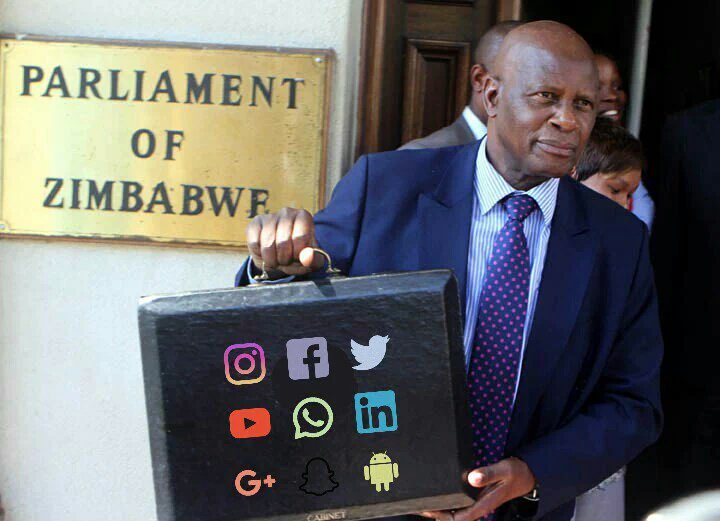By: Adam King
Impunity Rights News Reporter, Africa

HARARE, Zimbabwe — Cybersecurity is apparently an issue of priority for President Robert Mugabe. The timing could not be more interesting as the newly created Ministry of Cyber Security, Threat Detection and Mitigation, led by Patrick Chinamasa, comes shortly before presidential elections. If President Mugabe has learned one thing from the pervasiveness of social media, it is how it can give shape and energy to a civil movement.
This time last year, social media was used in Zimbabwe in a way that it had never been utilized before,
“Zimbabwe’s government has been uneasy about social media after pastor Evan Mawararire spearheaded the #ThisFlag movement last year…Using platforms like Twitter and Facebook it organized a stay-at-home demonstration, the biggest anti-government protest in a decade.”
The #ThisFlag movement involved the use of social media platforms to stage a stay-at-home protest against prolonged economic conditions. The leader of the movement, Pastor Evan Mawararire, used a cameo picture of Captain America in Zimbabwe flag colors to call on fellow citizens to wear their flags in protest. The pastor was hailed as a hero and was able to draw substantial attention to the issues he was protesting against without the use of violence.
#ThisFlag was an example of how social media for protests is becoming an effective means of protest to sub-saharan Africa. This should come as no surprise since in Zimbabwe alone, internet usage has grown from a mere 0.3% to 46% in the past 16 years. One out of every two Zimbabweans are accessing the internet. While internet access has accelerated in Zimbabwe over the last couple of decades, governments all over Africa have devised ways to prevent its citizens from reaching the internet,
“Governments don’t have the physical or technical ability to block sites, phones or texts themselves, explains Thecla Mbongue, analyst for trend forecasters Ovum. They issue an order to the companies who do have that power. Congo-Brazzaville’s government issued an order to the country’s mobile phone operators such as Airtel and MTN. This effectively blocks the internet because very few Congolese use fixed lines to access the web.”
In addition, recent events all over the world ranging from the major hacks of Equifax and HBO have made governments more sensitive to the vulnerabilities that cyber hacking naturally exposes. Cyber security is now more important than ever, but some are skeptical as to what this importance will mean with the balancing of civil liberties.
There are many civil liberties advocates in Zimbabwe who see the new ministry, which is the first in much of the world, as a way to threaten, silence or even arrest those who use social media to speak out against the government,
“One communications rights group, the Zimbabwe chapter of the Media Institute for Southern Africa (Misa), says this new scrutiny of social media goes against the spirit of the constitution and freedom of expression. Going a step further, Zimbabwe’s opposition Movement for Democratic Change (MDC) says the government’s new cyber threat ministry is a means for government to spy on its people…MDC leader Morgan Tsvangirai also believes that the ministry has been created to curb free speech in time for the 2018 polls… Meanwhile on social media, ominous warnings have begun circulating… One is from a “Mr Chaipa”, urging Zimbabweans only to share content on social media that they would be able to defend in court… Mr Chaipa said it was easy for the government to monitor online messages, and gave a list of online activities that could be classified as criminal offenses.”
There are clearly many groups in Zimbabwe that feel that this new ministry is the precursor to civil rights restrictions and violations. A new cybersecurity bill, which has also drawn the ire of the international human rights groups, further complicates the cybersecurity landscape in Zimbabwe,
“While Mugabe and the government describe the new ministry as “protective” i.e. acting in a defensive role, there are worries it is really aimed at attacking, like controlling social media use locally. This all comes as Zimbabwe finalizes a Computer and Cyber Crimes Bill that has already attracted criticism from human rights and freedom of expression campaign groups.”
The Zimbabwe government, however, assures that the worries are misplaced and civil liberties will not suffer under the new ministry,
“The Zimbabwean government has said new legislation will not stifle freedom of expression and will protect the public from new threats such as revenge pornography and cyber attacks. Presidential spokesperson Mr Charamba says Zimbabwe will look closely at how other nations have dealt with the threat of cybercrime – including Russia, China, and South Korea who have faced similar challenges.”
For more information, please see:
Bloomberg — ‘Executive Profile Patrick Anthony Chinamasa M.P.’ — 26 October 2017
Reuters — ‘Equifax, reeling from hack, still has no earnings report date’ — 25 October 2017
BBC News — ‘Why Zimbabwe has a Minister of WhatsApp’ — 24 October 2017
Quartz — ‘Zimbabwe has a new “minister of WhatsApp” whose first job seems to be to stop WhatsApp’ — 14 October 2017
Wired — ‘Breaking Down HBO’s Brutal Month of Hacks’ — 18 August 2017
BBC News — ‘Zimbabwe’s pastor hero: #ThisFlag preacher’ — 16 July 2016
BBC News — ‘How African governments block social media’ — 25 April 2016